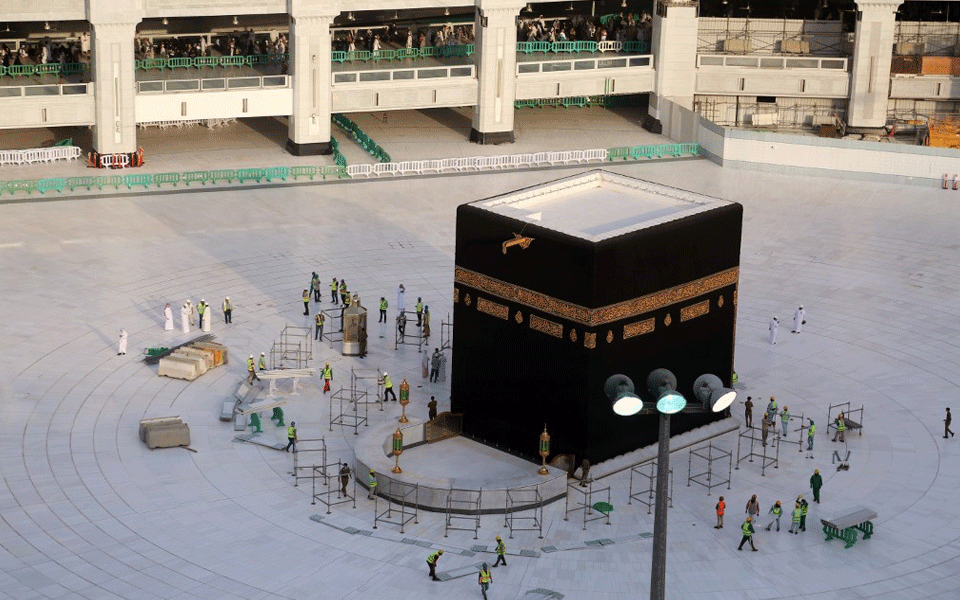Mecca: Saudi Arabia reopened Saturday the area around the sacred Kaaba in Mecca's Grand Mosque, Islam's holiest site, reversing one of a series of measures introduced to combat the coronavirus outbreak.
Saudi authorities this week suspended the year-round umrah pilgrimage, during which worshippers circle the Kaaba seven times, and also announced the temporary closure of the area around the cube structure.
But King Salman has "allowed for the opening of the Mataf (where people circle the Kaaba) for non-umrah performers" starting on Saturday at dawn, the official Saudi Press Agency (SPA) reported.
Hundreds of Muslims were seen rotating around the Kaaba, but the area between two hills that pilgrims must go between seven times to complete umrah remained closed.
Barricades blocked access to the Kaaba, draped in a gold-embroidered black cloth, while men in green uniforms cleaned the white-tiled floor.
Authorities had emptied the Grand Mosque for sterilisation on Thursday.
The unprecedented suspension of the umrah has raised uncertainty over the annual hajj pilgrimage, scheduled for the end of July.
Authorities have said prayers will be allowed at the Prophet's Mosque in Medina and in Mecca's Grand Mosque while the umrah is suspended, apart from during nighttime cleaning and sterilisation.
The suspension has left thousands of Muslim pilgrims in limbo.
Around two-thirds of the 18.3 million umrah participants in 2018 were citizens and residents of the kingdom, according to government statistics.
On Saturday, SPA said entry into Saudi Arabia from the United Arab Emirates, Kuwait and Bahrain would be "temporarily" restricted to three airports in Riyadh, Jeddah and Dammam.
Only commercial trucks will be allowed to cross by land, it added.
The newly established ministry of sports said it would "suspend public attendance" at all sports events starting Saturday, reflecting calls across the Gulf to cancel mass gatherings.
Some 2.5 million faithful travelled to Saudi Arabia from across the world in 2019 to take part in the hajj, which all Muslims must perform at least once in their lives if able.
The event is a massive logistical challenge for Saudi authorities, with colossal crowds cramming into relatively small holy sites, making attendees vulnerable to contagion.
Already reeling from slumping oil prices, the Saudi kingdom risks losing billions of dollars annually from religious tourism as it tightens access to the sites.
With the number of coronavirus cases in the Gulf region now more than 200, neighbouring Kuwait also announced additional precautionary measures.
It said it would suspend all flights to and from Bangladesh, the Philippines, India, Sri Lanka, Syria, Lebanon and Egypt for a week.
Let the Truth be known. If you read VB and like VB, please be a VB Supporter and Help us deliver the Truth to one and all.
Hyderabad (PTI): Telangana Chief Minister A Revanth Reddy met Union Home Minister Amit Shah in Delhi on Wednesday night and urged him to increase the sanctioned strength of IPS officers to the state in view of its growing administrative and security needs.
The two leaders also discussed the recent surrender of several senior Maoist leaders before the Telangana Police and other issues.
"During the meeting, the two leaders discussed the issue of Maoist surrenders and their rehabilitation. The chief minister informed Shah that significant improvements in policing have taken place in Telangana over the past two years," an official release here said.
Highlighting that 591 Maoists have laid down their arms and joined the mainstream of society during this period, the chief minister said the state government was providing them compensation and rehabilitation assistance as per the rules.
He requested the Union home minister to extend financial support from the central government for development works in the backward regions of the state.
Reddy also urged Shah to increase the sanctioned strength of IPS officers to the state from 83 to 105 in line with the state's growing administrative and security needs, the statement said.
The first cadre review after the formation of Telangana was conducted in 2016, while the next review, due in 2021, was delayed and finally carried out in 2025. Even then, only seven additional IPS officers were allocated to the state, the chief minister informed Shah and requested that the third cadre review be conducted in 2026 as per the schedule.
Reddy explained that Telangana, like the rest of the country, is facing several modern challenges, including cybercrime, drug trafficking, white-collar crimes, and other emerging security threats.
He highlighted the reorganisation of the Hyderabad, Cyberabad, and Malkajgiri Police Commissionerates, the proposed formation of the Future City Commissionerate and the rapidly growing population in Hyderabad to underline the increasing administrative requirements of the state.





